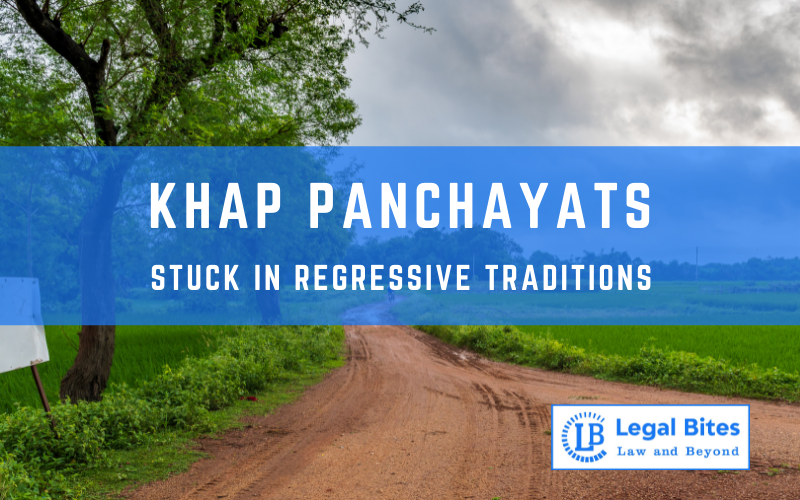Stuck in Regressive Traditions: Khap Panchayats
Recently, as I was roaming around in the bottomless pit that is the World Wide Web, I came across a particularly interesting Twitter account – @khappanchayat. Their bio reads, “Making the world a better place, one missing couple at a time. Go against us and we’ll fatwa your behinds”. Sadly, no other description could have been more accurate.… Read More »

Recently, as I was roaming around in the bottomless pit that is the World Wide Web, I came across a particularly interesting Twitter account – @khappanchayat. Their bio reads, “Making the world a better place, one missing couple at a time. Go against us and we’ll fatwa your behinds”. Sadly, no other description could have been more accurate. The last decade has seen an uprising in the adoption of liberal values and the targeting of regressive ones propagated under the guise of “sanskar” and “Indian culture”.
A major proponent of such regressive values is Khap Panchayats. Khap panchayats have been hugely criticized as being extremely conservative. Their adamant refusal to even consider liberalism just expounds the problem.
What are Khap Panchayats?
A Khap panchayat or caste council regulates a “Khap” – a community of the families of the same ‘gotra’ The concept of Khap panchayats is very old and so they hold a lot of sway on the opinions of the people. A Khap panchayat is not affiliated with the Government in any way and is only concerned with the affairs of the “Khap” or the community it represents. A Khap panchayat mainly constitutes of the elders in the community with no representation of women. Khap panchayats are mainly found in North India – particularly among the Jat people of Western Uttar Pradesh and Haryana.
Why were they in the news so long?
Khap panchayats are infamous for enforcing traditional, regressive rules on the Khaps they regulate. As said before, Khap panchayats exist to regulate a community of the same ‘gotra’ or clan, and so one of their main purposes is to prevent intra-clan and inter-caste marriages. And they don’t use any peaceful means – these people believe in taking the law into their own hands. Moreover, they have various other outdated and, more often than not, ridiculous beliefs which they insist be followed by everyone to the letter.
For instance, a Khap panchayat in Haryana’s Jind district made headlines in 2012 when it blamed the consumption of chow mein for the growing incidents of rapes, saying that it leads to “hormonal imbalance”. A week earlier, Khap leader Sube Singh had asked for lowering the marriageable age for girls from 18 to 16 on the basis that young girls are more vulnerable to rape and should be married off earlier.
Khap panchayats were in the news again when, late in 2012, several cases of honour killings surfaced. Honour killings because two lovers turned out to be of the same ‘gotra’ – which they believe is wrong. Since you don’t check a person’s ‘gotra’ and then decide if you want to fall in love, a lot of couples have had to meet with horrible fates.
Strong support from politicians, none from the judiciary
Surprisingly, despite all this, Khap panchayats enjoy a lot of political support. Haryana Chief Minister Manohar Lal Khattar has this to say about Khap panchayats – “They are like parents minding the children, and they take swift decisions on matters in which the courts are silent. Khap panchayats consist of experienced members of the society and make sensible decisions.” Former Haryana CM Bhupinder Singh Hooda also defended Khap panchayats, saying that “Khap panchayats don’t order such killings”.
On the other hand, the Supreme Court has deemed such “kangaroo courts” illegal. A Bench of Justices Markandey Katju and Gyan Sudha Misra said, “this is wholly illegal and has to be ruthlessly stamped out. There is nothing honourable in honour killing or other atrocities and, in fact, it is nothing but barbaric and shameful murder.
Other atrocities in respect of the personal lives of people committed by brutal, feudal minded persons deserve harsh punishment. Only this way can we stamp out such acts of barbarism and feudal mentality. Moreover, these acts take the law into their own hands, and amount to kangaroo courts, which are wholly illegal.” In 2018 again, a Bench of Chief Justice Dipak Misra and Justices D Y Chandrachud and A M Khanwilkar termed the attacks by Khap panchayats against inter-caste marriages “absolutely illegal”.
The way forward
While Khap panchayats don’t enjoy any powers, it would be unconstitutional to completely ban them out – there is nothing wrong with citizens forming assemblies or groups as long as they do not indulge in any illegal activities. However, the rising rates of honour killings are alarming and should be dealt with firmly. The regressive thinking of Khap panchayats is also disturbing. More needs to be done by the State to ensure that such thinking doesn’t come in the way of our growth as a society and as a nation.
Sources
- Hooda defends khap panchayats, says they do not order honour killings, Available Here
- Haryana CM Manohar Lal Khattar defends khap panchayats, Available Here
- J. Venkatesan, Stamp out khap panchayats: court, Available Here
- अतुल संगर, क्या है खाप पंचायत, क्यों है उसका दबदबा?, Available Here
- Manveer Saini, Haryana khap blames consumption of chowmein for rapes, Available Here
- Singh, Vineet. (2015). Khap Panchayats: Honor Killings in India.


